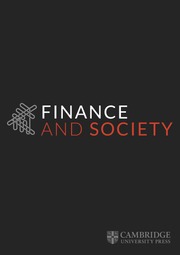No CrossRef data available.
Article contents
Endgame: The false destruction of the social imaginary
Published online by Cambridge University Press: 09 November 2023
Extract
Core share and HTML view are not available for this content. However, as you have access to this content, a full PDF is available via the ‘Save PDF’ action button.
Vogl's account of contemporary financial truth games suggests that a full understanding of our present condition requires the kind of knowledge produced by fiction and those who study it. But what kind of knowledge is that, and how does it escape the capitalist ontology of information?
Information
- Type
- Forum: Capital and ressentiment
- Information
- Creative Commons
- This is an Open Access article, distributed under the terms of the Creative Commons Attribution-NonCommercial-No Derivatives licence (http://creativecommons.org/licenses/by-nc-nd/4.0/), which permits noncommercial re-use, distribution, and reproduction in any medium, provided the original work is unaltered and is properly cited. The written permission of Cambridge University Press must be obtained for commercial re-use or in order to create a derivative work.
- Copyright
- © 2021 The Author(s)
References
Davies, W. and McGoey, L. (2012) Rationalities of ignorance: On
financial crisis and the ambivalence of neo-liberal
epistemology. Economy and Society,
41(1):
64–83.Google Scholar
Davies, W. (2018) Nervous States: How Feeling Took Over The
World.
London: Jonathan
Cape.Google Scholar
Duquette, E. (2019) The Confidence-Man between
genres. In: Marrs, C. (ed.) The New Melville Studies.
Cambridge: Cambridge
University Press,
96–113.Google Scholar
Gorton, G. (2016) The history and economics of safe
assets. SSRN, 31 August. Available at <https://ssrn.com/abstract=2770569>. Accessed 13 December
2021..+Accessed+13+December+2021.10.3386/w22210>Google Scholar
Kling, M.-U. and Kissel, B. (2021) Känguru-Comic No. 297 Alarmglocken.
Zeit Online, 9 December. Available at: <https://www.zeit.de/kaenguru-comics/2021-12/folge-297>.
Accessed 13 December 2021..+Accessed+13+December+2021.>Google Scholar
Melville, H. (1984) The Confidence-Man: His Masquerade
[1857]. Evanston, IL:
Northwestern University
Press.Google Scholar
Lüdemann, S. (2002a) Die nackte Wahrheit.
In: Frank, T. et al (eds.) Des Kaisers neue Kleider: Über das
Imaginäre politischer Herrschaft.
Frankfurt a. M.:
Fischer,
95–102.Google Scholar
Lüdemann, S. (2002b) Fetischismus. In:
Frank, T. et al (eds.) Des Kaisers neue Kleider: Über das
Imaginäre politischer Herrschaft.
Frankfurt a.M.:
Fischer, 187–96.Google Scholar
Poovey, M. (1998) A History of the Modern Fact: Problems of
Knowledge in the Sciences of Wealth and Society.
Chicago, IL: University of
Chicago Press.Google Scholar
Vogl, J. (2021a) Kapital und Ressentiment: Eine kurze
Theorie der Gegenwart.
München:
C.H. Beck.Google Scholar
Vogl, J. (2021b) Capital and ressentiment: The
totalizing power of social fragmentation. Finance
and Society, 7(2):
123–28.Google Scholar
Vogl, J. (2022) Capital and Ressentiment,
translated by Solomon, N.. Cambridge:
Polity.Google Scholar

